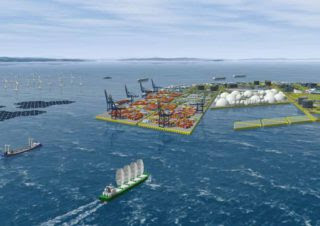Even if the traditional approach of reducing hull resistance and obtaining optimum propulsive efficiency remains a must-do step in ship design, this expertise alone will not bring the industry to the ultimate goal of zero emission transport. The state of the art expertise on that level is close to reaching a plateau in terms of further improvement.
WMN…MARIN has set a new course in its technology plan to sustain the necessary energy transition that must and will occur in maritime transport.
This is the reason why MARIN’s research themes will also cover design for service conditions, zero emission shipping through non-fossil power sources and their integration in the ships design.
Knowledge of expected operational conditions of the ships are of great importance. Onboard monitoring of actual ships in service and the use of the measured information, gathered in the commonly used big data terminology, will certainly help define what ships are really meant to do. Understanding which design parameters will make ships more competitive or safer will also help introduce innovative solutions that will be tested virtually onboard digital twins of the given design.
Today, it is possible to generate a few hundred hull forms, to calculate many combinations of trim, sinkage and speed profiles, within a decent amount of time. Added resistance in waves and minimum power requirements to sail safely can also be brought into concept advice. But, all of this creates quite a challenge to find out what is the best design choice after all.
“The amount of data generated urges us to better select the data we want to gather and to also develop smart algorithms and methods to support the choices that will be made at a concept level. Smart data will take the lead on big data in that respect.”
Shipping goods around the world with zero emission will need however more than optimum designs. This change requires additional expertise and disruptive solutions. The end of fossil fuels in shipping is possible, with the use of electric engines powered by renewable electricity for example. The carrier of electricity will come in the form of hydrogen, batteries or new synthetic fuels, but certainly multiple and hybrid integrated solutions. Using a new type of engine and new source of energy is going to influence the way ships are designed and operated.
Different hard points in the design constraints will certainly impact the design and operations of future ships. Such as increased possibilities in the weight distribution and internal arrangement. Or for example logistics aspects related to new type of infrastructures for bunkering. Zero emission shipping will be covered in MARIN’s upcoming research by the development of a hydro-system integration lab, in order to accompany the maritime industry in this extraordinary transition. This lab will integrate the power train and all related controls together with the hydrodynamic aspects of propulsion systems.
Even though new carbon-free energy sources will be brought onboard, it will remain important to use as less energy as possible onboard. Obviously to always improve the range of ships. Use of wind energy, as an alternative propulsion source, is one of those possibilities. Efficient and modern sail devices (rigid profiles, Flettner rotor or alternative suction profile) allow ships to harness the power which is freely available in the oceans. Using it to simply assist ship propulsion, is an obvious way forward to minimize energy required onboard.
Reduction of power use within 5 to 40 per cent, depending on the area of operations and ship types, is possible. Which is by far better than any expected further actual improvement of hydrodynamic performances. The future of shipping will be made out of designs optimised for service conditions, driven by renewable energy sources and making smart use of environmental forces such as wind. MARIN will hopefully support the maritime sector in this great opportunity to make better ships.
Guilhem Gaillarde Manager Ships MARIN (Maritime Research Institute Netherlands)
Industry’s view is provided by one of the firms affiliated with the Dutch maritime network organisation Maritime by Holland.
Credit: World Maritime News.

